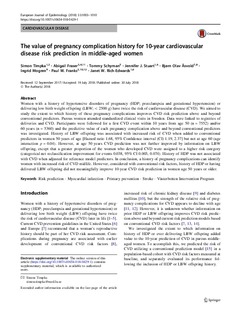| dc.contributor.author | Timpka, Simon | |
| dc.contributor.author | Fraser, Abigail | |
| dc.contributor.author | Schyman, Tommy | |
| dc.contributor.author | Stuart, Jennifer J. | |
| dc.contributor.author | Åsvold, Bjørn Olav | |
| dc.contributor.author | Mogren, Ingrid | |
| dc.contributor.author | Franks, Paul W. | |
| dc.contributor.author | Rich-Edwards, Janet Wilson | |
| dc.date.accessioned | 2019-05-22T08:44:54Z | |
| dc.date.available | 2019-05-22T08:44:54Z | |
| dc.date.created | 2018-10-01T13:27:31Z | |
| dc.date.issued | 2018 | |
| dc.identifier.citation | European Journal of Epidemiology. 2018, 33 (10), 1003-1010. | nb_NO |
| dc.identifier.issn | 0393-2990 | |
| dc.identifier.uri | http://hdl.handle.net/11250/2598410 | |
| dc.description.abstract | Women with a history of hypertensive disorders of pregnancy (HDP; preeclampsia and gestational hypertension) or delivering low birth weight offspring (LBW; < 2500 g) have twice the risk of cardiovascular disease (CVD). We aimed to study the extent to which history of these pregnancy complications improves CVD risk prediction above and beyond conventional predictors. Parous women attended standardized clinical visits in Sweden. Data were linked to registries of deliveries and CVD. Participants were followed for a first CVD event within 10 years from age 50 (n = 7552) and/or 60 years (n = 5360) and the predictive value of each pregnancy complication above and beyond conventional predictors was investigated. History of LBW offspring was associated with increased risk of CVD when added to conventional predictors in women 50 years of age [Hazard ratio 1.68, 95% Confidence interval (CI) 1.19, 2.37] but not at age 60 (age interaction p = 0.04). However, at age 50 years CVD prediction was not further improved by information on LBW offspring, except that a greater proportion of the women who developed CVD were assigned to a higher risk category (categorical net reclassification improvement for events 0.038, 95% CI 0.003, 0.074). History of HDP was not associated with CVD when adjusted for reference model predictors. In conclusion, a history of pregnancy complications can identify women with increased risk of CVD midlife. However, considered with conventional risk factors, history of HDP or having delivered LBW offspring did not meaningfully improve 10-year CVD risk prediction in women age 50 years or older. | nb_NO |
| dc.language.iso | eng | nb_NO |
| dc.publisher | Springer Verlag | nb_NO |
| dc.rights | Navngivelse 4.0 Internasjonal | * |
| dc.rights.uri | http://creativecommons.org/licenses/by/4.0/deed.no | * |
| dc.title | The value of pregnancy complication history for 10-year cardiovascular disease risk prediction in middle-aged women | nb_NO |
| dc.type | Journal article | nb_NO |
| dc.type | Peer reviewed | nb_NO |
| dc.description.version | publishedVersion | nb_NO |
| dc.source.pagenumber | 1003-1010 | nb_NO |
| dc.source.volume | 33 | nb_NO |
| dc.source.journal | European Journal of Epidemiology | nb_NO |
| dc.source.issue | 10 | nb_NO |
| dc.identifier.doi | 10.1007/s10654-018-0429-1 | |
| dc.identifier.cristin | 1616760 | |
| dc.description.localcode | © The Author(s) 2018. This article is distributed under the terms of the Creative Commons Attribution 4.0 International License (http://creativecommons.org/licenses/by/4.0/) | nb_NO |
| cristin.unitcode | 194,65,20,0 | |
| cristin.unitname | Institutt for samfunnsmedisin og sykepleie | |
| cristin.ispublished | true | |
| cristin.fulltext | original | |
| cristin.qualitycode | 2 | |

